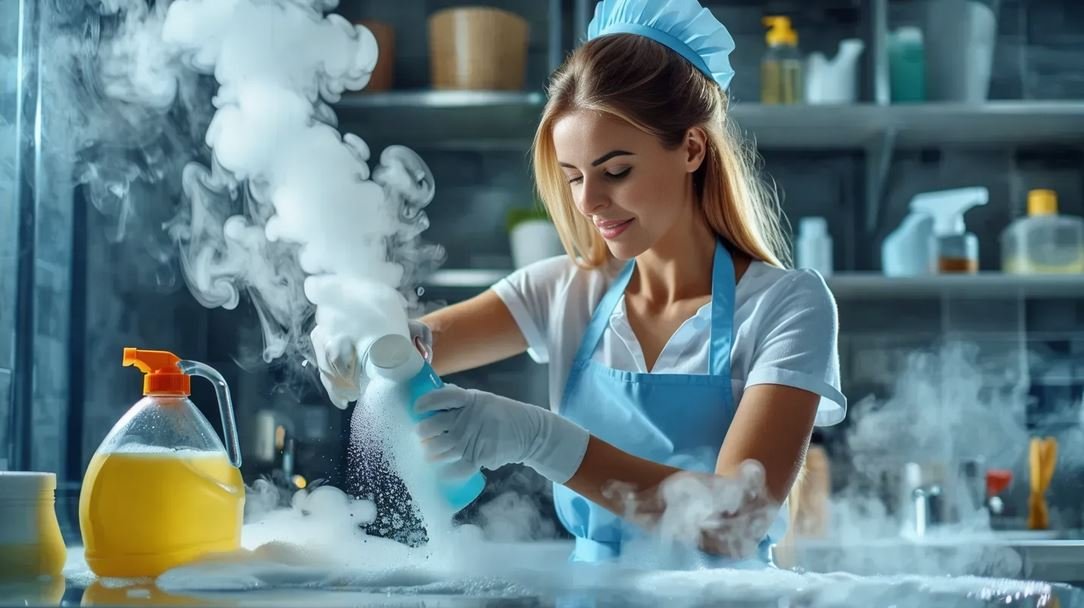Can You Mix Clorox And Lysol? (NO - Here’s Why)
Ever wondered if you could make your cleaning routine more effective by mixing different products?
Well, when it comes to household cleaners like Clorox and Lysol, that's actually a really bad idea. Combining these popular cleaners can be seriously dangerous.
In this post, I’ll explain what happens if you mix Clorox and Lysol , what to do if it happens by accident.
What Happens When You Mix Clorox And Lysol
Mixing Clorox (which contains bleach) and Lysol creates a dangerous chemical reaction that can have serious consequences.
The main problem comes from the reaction between the sodium hypochlorite in Clorox and the ammonia or ammonium compounds often found in Lysol products. This creates chloramine gasses, mainly chlorine gas.
This reaction isn't slow and subtle - it happens fast and can get pretty intense, often producing heat along with the toxic gasses.
You might notice a strong, weird smell and maybe even see some fumes.
These gasses are heavier than air, so they stay low to the ground, which makes them especially dangerous for children and pets.
Also Read: Bleach smell stuck in nose after cleaning
The Dangers Of Chloramine Gasses
Now, let's talk a bit about why these chloramine gasses are bad news.
They're toxic, and breathing them in can cause all sorts of health problems, from mild irritation to severe breathing issues.
If you breathe in these gasses, you might start coughing, wheezing, or have trouble breathing. They can also irritate your eyes and nose and cause burning and discomfort.
In really bad cases, you could end up with chemical pneumonia, which is as scary as it sounds.
Accidentally Mixed Lysol And Clorox - What To Do?
If you've accidentally mixed Clorox and Lysol, it's important to act quickly to reduce your exposure to the toxic fumes. Here's what you should do:
Ventilate The Area
Your first priority should be to increase ventilation right away.
Open all windows and doors wide to let fresh air in. If you have fans, use them to blow the contaminated air outside. Don't just rely on bathroom fans or kitchen exhaust fans, as these might not move enough air.
If possible, try to create a draft by opening windows on opposite sides of your home.
The goal is to get rid of the toxic gasses as quickly as possible.
Also Read: Does Lysol Kill Giardia?
Leave The Area
Once you've got the air moving, it's time for you to move, too. Get out of there! Don't hang around trying to clean up the mess - that can wait.
Make sure to tell anyone else in the house what's going on too.
If you live in an apartment building, consider telling your neighbors on the same floor, as fumes can sometimes travel through walls or ventilation systems.
Go to a safe, open area outside where you can breathe fresh air.
Seek Medical Attention
Even if you feel okay, keep an eye on how you're feeling. Sometimes, the effects of breathing in these gasses don't show up right away. Watch out for things like:
Coughing
Shortness of breath
Chest pain
Wheezing
Nausea
Watery eyes
Irritation in your nose and throat
Headaches
If you notice any of these, even if they seem mild, don't brush them off. Call for help or get yourself to the emergency room.
It's always better to be safe than sorry.
Other Things You Should NOT Mix With Clorox Or Lysol
While we're on the topic, let's talk about some other things you should never mix with either Lysol or Clorox. Basically, these products shouldn't be mixed with most other household cleaners.
For Clorox (bleach), don't mix it with ammonia, vinegar, or rubbing alcohol, as these combinations can also create toxic gasses or harmful compounds.
As for Lysol, besides avoiding bleach, keep it separate from hydrogen peroxide and any cleaners with ammonia or acids.
Also Read: Clorox 2 Vs OxiClean
Always read product labels carefully and use cleaning products separately to stay safe.
Wrapping Up
Using household cleaners safely is super important.
Clorox and Lysol are good at killing germs and bacteria, but mixing them creates a dangerous situation that's much worse than any benefits you might think you'd get.
Always use these products as directed on their labels, and never combine them or mix them with other cleaning products.
If you're not sure about whether it's safe to combine cleaning products, it's best to use them separately.
Your health and safety are more important than trying to create a stronger cleaner.
FAQs
Can You Mix Clorox And Lysol In Water?
No. While both Clorox and Lysol can be diluted with water, mixing them together will still produce harmful chemical reactions and chlorine gas.
Can You Mix Lysol And Clorox Wipes?
No. Mixing these products can also lead to dangerous chemical reactions.
Lysol With Bleach Chemical Reaction
Yes. Mixing Lysol with bleach can produce toxic chlorine gas, a highly dangerous substance that can cause severe health problems.
Can You Mix Lysol And Vinegar?
No. Mixing Lysol with vinegar can also create harmful fumes.

